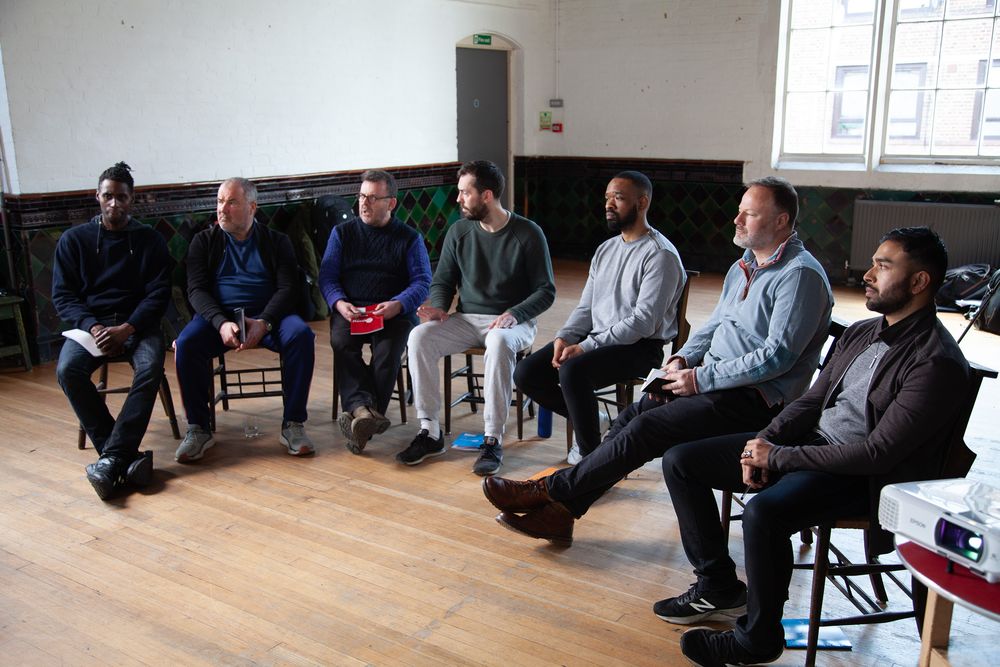
Overview of the ADVANCE-D Programme
We offer comprehensive training on all elements of ADVANCE-D to enable local delivery of the programme


5% Profits Donated
5% of all profits from the training and certification of facilitators and partner support workers is donated to charities and organisations supporting women experiencing domestic abuse.
Evidence-Based
ADVANCE-D is an evidence-based targeted perpetrator intervention for men in the context of substance use, who are usually excluded from domestic abuse perpetrator programmes due to their substance use.
Full Range
“A full range of effective perpetrator responses available across all areas and designed for all communities is essential to reducing risk, increasing the safety of adult and child victim-survivors, and breaking the cycle of domestic abuse for good by tackling the root cause” (A Call for Further Action: Strengthen The Response to Perpetrators of Domestic Abuse).
Overview of the ADVANCE-D Programme
The ADVANCE-D Programme
ADVANCE-D was developed (funded by the UK National Institute for Health Research) over 6 years to address the complex interplay between substance use and IPV identified in our research and neglected in other perpetrator programmes.
Our research identified a complex interplay between substance use and intimate partner abuse perpetration in the context of intoxication, withdrawal, craving and acquiring substances.
However, these were rarely the only explanation, as IPV was linked with sexual jealousy, and with men’s perceptions of their partners’ behaving improperly and opposing male authority. ADVANCE-D targets individual risks for IPV, including substance use, poor emotional regulation, and poor stress-coping, and teaches men how to reduce these risks by promoting self-regulation (ability to alter a response or override a thought, feeling, or impulse) and personal goal setting. The programme relies on positive therapeutic alliance, well facilitated group processes and strengths-based change.
The ADVANCE-D Programme and its evaluation are described in more detail in this short film.
How Is It Delivered?
ADVANCE-D is delivered in 32 sessions, which can be offered remotely or in-person by two trained facilitators over a minimum of 14 weeks.
The programme then follows a structured delivery path, including individual goal planning, preparing for group, self-directed website sessions (moving workbooks) and coaching calls to help with understanding monitoring and engagement.
Sample fortnight
The 12 weekly, self-directed website sessions are guided by a digital coach to recap and practice skills learned in the online group sessions.
Coaching calls are delivered by a facilitator to go over the materials in the previous group and website session, check in with the participant around their relationship and substance use, especially any change in risk and continue to enhance motivation and revisit goals.
A refresher session is offered 1 month after the last group session takes place.
The ADVANCE-D facilitator’s manual and delivery materials including the website sessions are currently available in English, Polish, Romanian, Urdu and Panjabi. Blended delivery provides flexibility and opportunity for men to attend groups across geographical areas and languages. Read more about the training programme here.
The individual session with a facilitator is primarily focused on setting goals, developing a personal safety plan and increasing motivation. There is then a preparatory group to prepare participants for taking part in ADVANCE-D; six fortnightly groups, 12 self-completed website sessions and 12 coaching calls to account for best practice in terms of monitoring and managing risk and safety and increasing skills and knowledge.
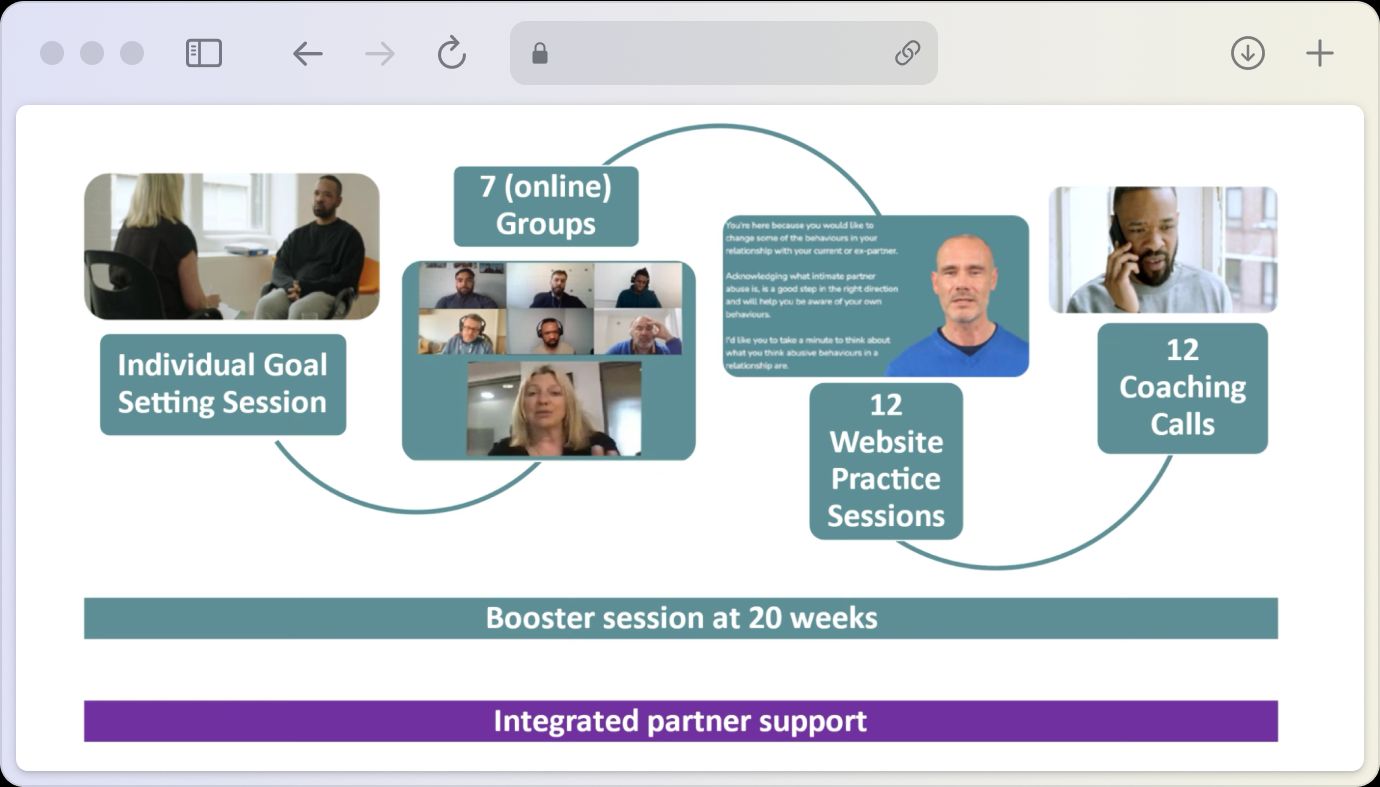
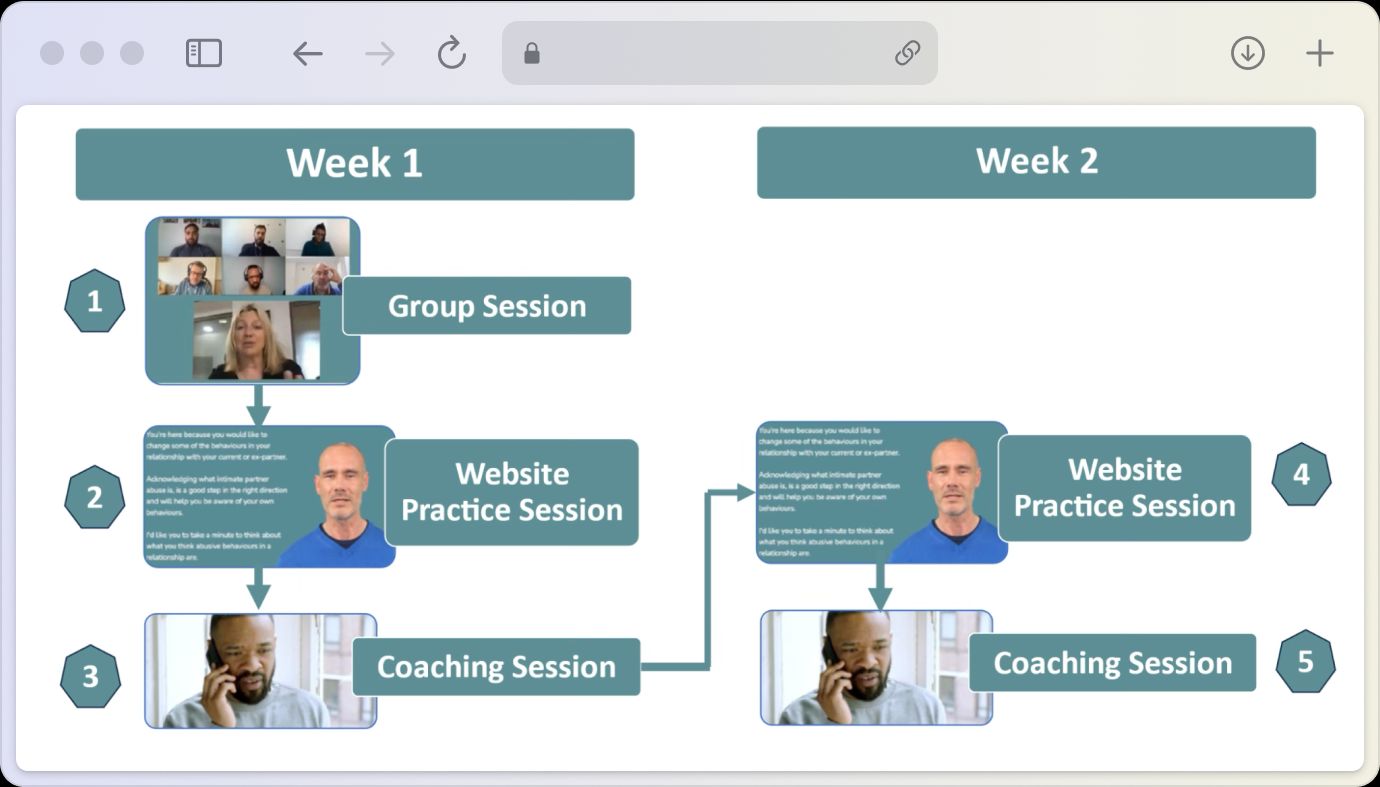
“When you do the session by yourself online after the group, I find that l helpful in a different way… you talk about stuff in the group and then you go and do the online session and then that’s what I sit down with the notebook and make notes. They work very well together”
- ADVANCE-D Group Member
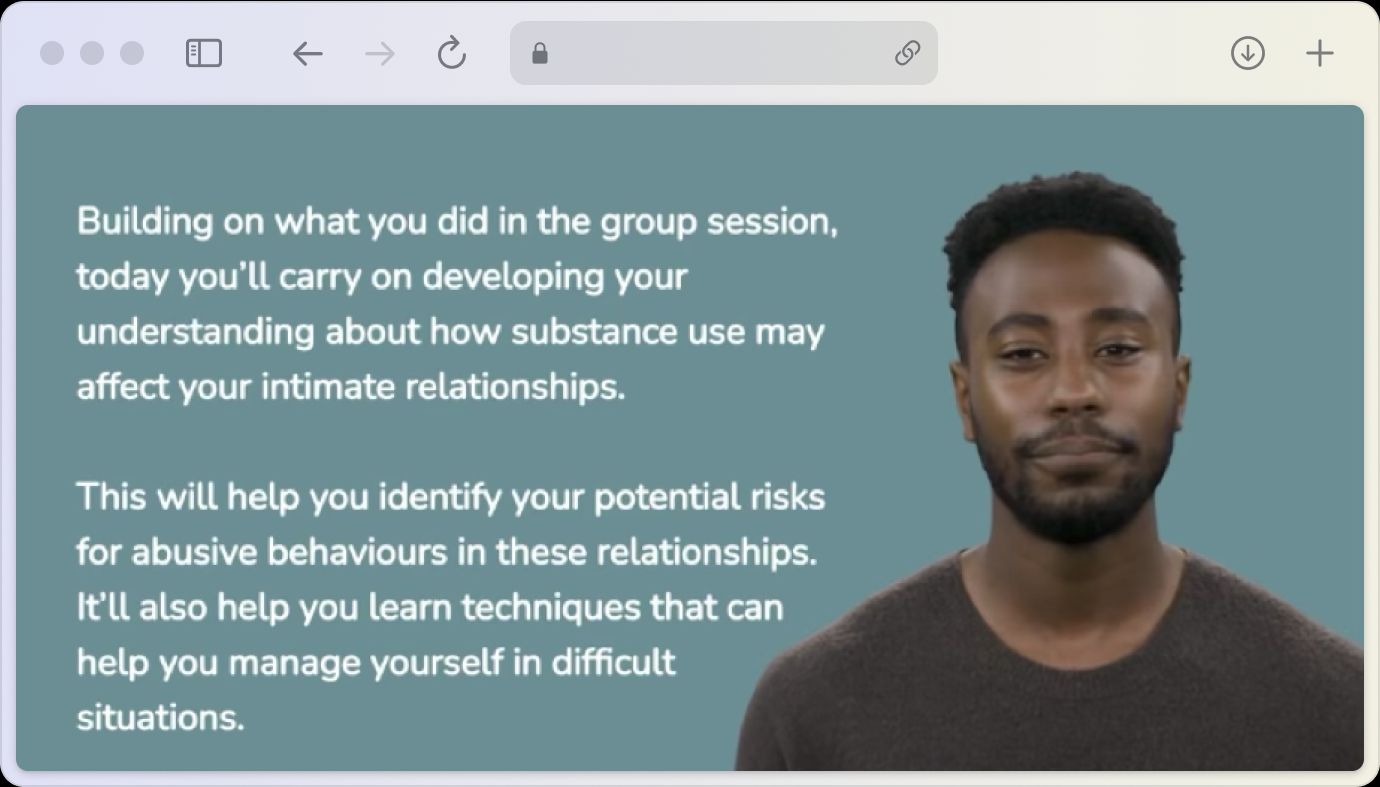
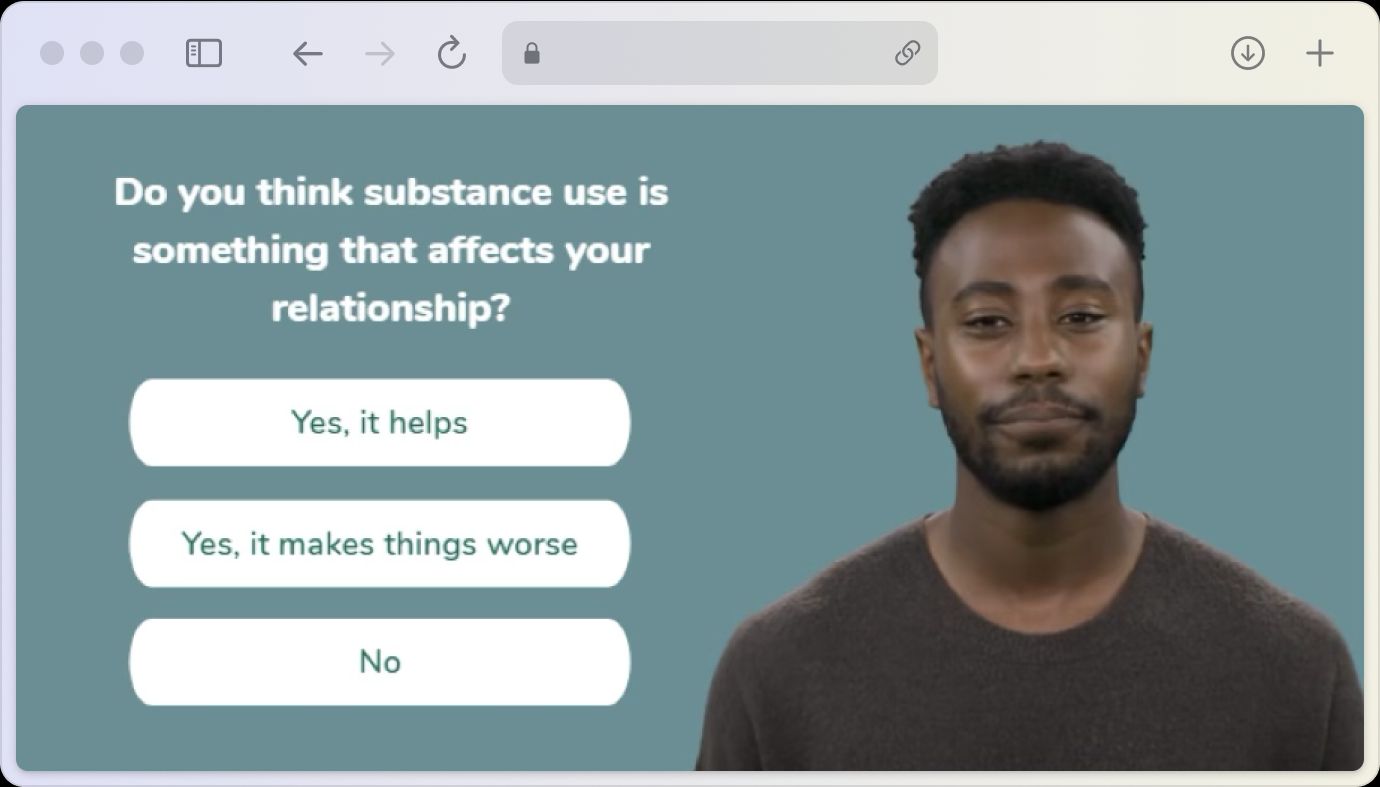
“Coaching calls were absolutely brilliant and when I was going through tough times… [the facilitator] was a great support. They reinforced a lot of the messages that we were doing in the groups, and it was real-time support with what was going on in my life, which I think is invaluable”
- ADVANCE-D Group Member
How Does It Work?
ADVANCE-D teaches men how to reduce their abusive behaviour by promoting prosocial self-regulation) using personal goal setting to enhance motivation.
ADVANCE-D uses skilled staff to work with men, whilst supporting partners and ex partners, to promote real change. The delivery options are flexible and include online groupwork, website sessions and telephone or in person coaching sessions.
-
Self Managed Website Sessions
The self-managed website sessions cover the material from each groups work session again, reiterating key messages, and inviting the men to apply the questions and learning to themselves and their relationships. This allows men to actively work through the material, apply their growing awareness of different types of abusive behaviours to themselves, consider how their substance use has affected their intimate relationships and consider alternative ways of thinking, managing and responding, by challenging some of their implicit beliefs about acceptable behaviour for men, and old excuses relating to the use of substances.
-
Coaching Calls
The coaching calls are planned for soon after each website sessions, to check out understanding of the key messages, help the men see where and how they might apply these messages in their own lives, and check on how their lives are going more generally in relation to their intimate relationships and their substance use.
Men in the studies conducted to date have rated these calls very highly.
“ADVANCE-D is a truly flexible programme, which can be delivered with groups and coaching calls in person or online alongside self-directed website sessions remotely or in services. Staff are fully certified and all materials for training and delivery are available online.”
- Liz Gilchrist, Professor of Psychological Therapies and co-lead investigator and ADVANCE-D clinical lead, University of Edinburgh
-
How does ADVANCE-D differ from perpetrator programmes?
ADVANCE-D is the only UK based integrated programme that addresses both IPA and SUD together. The ADVANCE-D model understands the links between using, craving, seeking or coming down from substance use, and integrates this with a clear model of intimate partner violence which addresses the range of abuses with control and gendered entitlement at their core.
-
Who is the ADVANCE-D Programme for?
The overall aim is to safeguard victims and survivors of IPV.
ADVANCE-D is for men who have used abusive behaviour in the context of substance use towards a female partner and who present a moderate risk in terms of likelihood, imminence and severity of abuse. It has been delivered in substance use treatment services, probation and criminal justice social work services.
-
How was it developed?
The ADVANCE-D programme was developed with funding from the National Institute for Health Research (NIHR) over six years to address the complex interplay between substance use and IPV perpetration identified in our research and neglected in other perpetrator programmes. The programme was developed based on academic theory and evidence and drew on professional expertise, guidance from experts by experience and pilot testing to craft the final product. The programme is based on intervention principles of best practice drawn from the “what works” literature, the Risk-Needs-Responsivity model, Good Lives Model and incorporates a motivational element drawing from elements of strengths-based approaches identified from practice literature. The programme applies CBT model, self-regulation and positive coping, to promote individual change.
“I think it’s great to be able to have something targeted towards a group which really requires additional support and who may be otherwise left behind”
- Commissioner
Integrated Partner Support
Mapping of domestic abuse services by The Domestic Abuse Commissioner of England and Wales found that “Overall, more than half of survivors wanted their perpetrator to receive support to change their behaviour – but just 7% of them got it”.
Integrated partner support alongside regular case management meetings with the facilitators and clear respectful and information sharing protocols, are essential components of the ADVANCE-D Programme.
In order not to privilege group participants over their current or ex partners, we developed a current or ex-partner version of the perpetrators’ website, containing safety messages for current or ex partners who can view but not interact with the website content. And as partner voices are seen as the ‘gold-standard’ outcome measure in IPV, ADVANCE-D also asked partners about change.
In addition to participants saying that they had changed, partners also reported that ADVANCE-D had helped in their relationships.
In our evaluation study, 8/11 (ex)-partners reported reductions in abusive behaviours by the end of ADVANCE-D. Men’s current or ex-partners also reported reductions in experiencing controlling behaviours, their partner using their or her children against her and stalking behaviours.


“It was just nice having someone to talk to you that doesn't judge”
- Partner
Treatment Management and Integrity Support
Guided by best practise
Guided by best practice, the ADVANCE-D model includes fortnightly ‘integrity support’/treatment management meetings, to consider the needs of the individual group members, enhance the functioning of the group, review material delivered in previous sessions, plan delivery of material in upcoming sessions, reinforce key messages to be communicated and stick to the ADVANCE-D model.
The expectation is that the meeting will consider each participant and their partner or ex-partner and family needs, risk s, safety and protective factors, take this into account in the provision of services and support to the partner or ex-partner and in the delivery of the material to the participant, and ensure any actions or referrals are made to promote the safety and well-being of all involved.
Similar to many case management meetings, clear confidentiality and data sharing protocols are advised.
Risk Assessment, Assessment training and Support
Prior to the individual goal setting there is also comprehensive risk assessment and risk and safety planning.
Our pre-programme assessment uses the structured professional judgement approach, applying internationally accepted risk assessment and victim safety assessment tools to inform selection into the programme and management around the programme.
We require professionals to profile risk, consider risk and safety management considerations to select the correct group participants into the ADVANCE-D programme at the right time and under the right conditions.